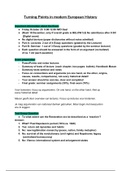Samenvatting
Summary Complete Lecture Notes: Turning Points in Modern European History
- Instelling
- Universiteit Van Amsterdam (UvA)
A complete overview of all my notes taken during the Turning Points in Modern European History lectures. ENGLISH. (The dutch parts are just translation of words for myself to make studying easier! So if you are a Dutchie, the difficult English words are translated for you! If you're not, you won't ...
[Meer zien]





